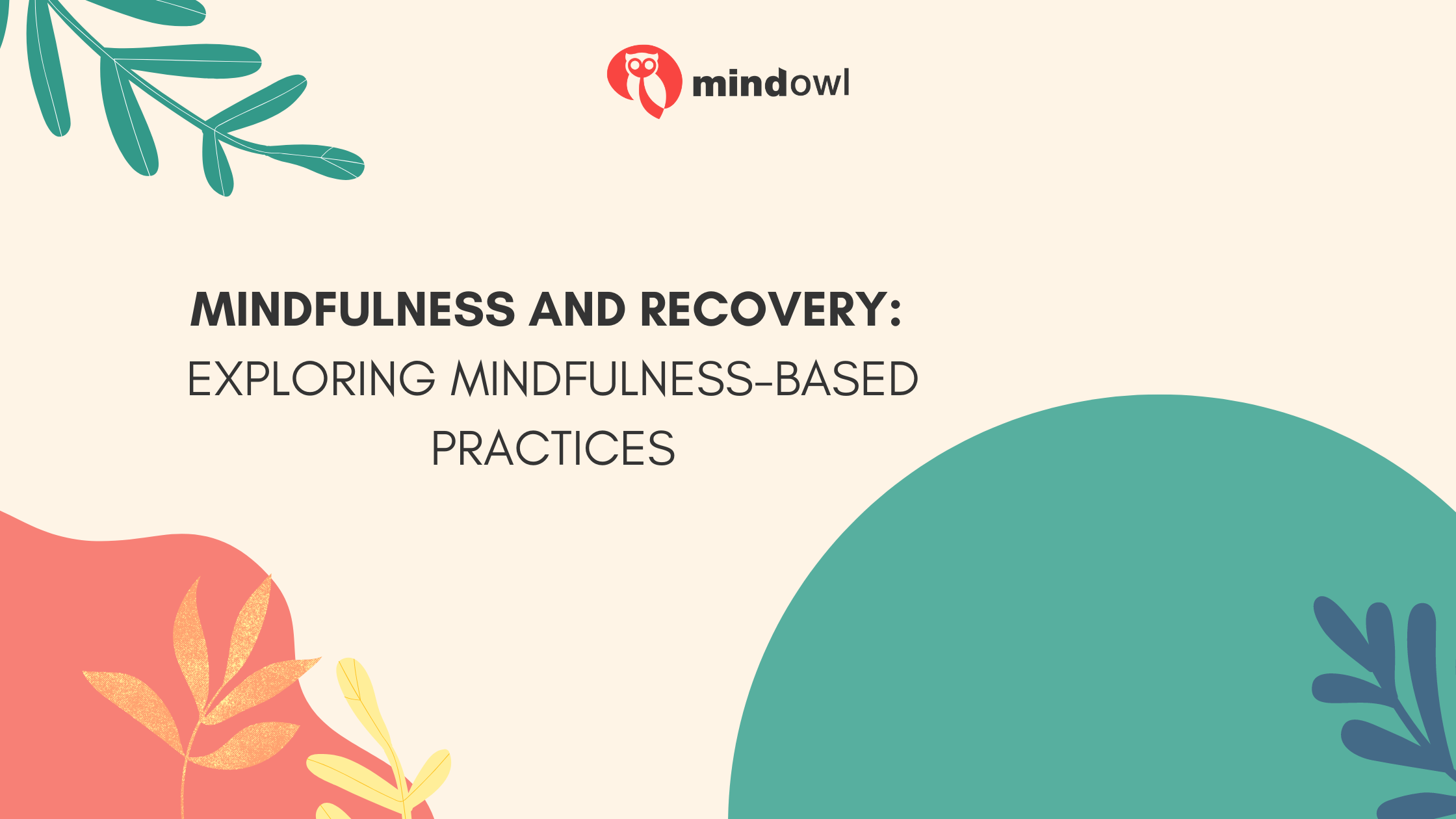If you’re on a journey to recovery, you might often find yourself wrestling with cravings, emotional swings, and the shadows of your past. It’s tough, and sometimes it feels like an uphill battle.
Here’s something that might catch your interest – mindfulness has become a beacon for many in this fight. Research indicates that incorporating mindfulness into one’s healing process can significantly dial down stress levels and empower individuals to handle challenges with more resilience.
This article will walk you through how mindfulness-based practices can transform the recovery experience. From taming wild thoughts to finding peace in the present moment, we’ll show how these strategies offer a lifeline back to sobriety and self-control.
Expect practical tips on meditation techniques and staying grounded amidst life’s storms—tools that promise not only survival but thriving in long-term recovery. Ready to discover your inner strength?
Key Takeaways
- Mindfulness helps people in recovery pay attention to the present and not get lost in past worries or future fears. It can lower stress, anxiety, and depression while improving sleep and blood pressure.
- Using mindfulness techniques like meditation makes it easier for those recovering to handle cravings and avoid relapse. These practices teach how to observe thoughts without judgment, helping individuals stay calm during tough times.
- Mindfulness improves relationships by fostering better communication and emotional awareness. It supports a deeper connection with oneself and others, enhancing support systems during recovery.
- Practicing mindfulness aids in coping with violent thoughts and behaviors by encouraging self-awareness, compassion, forgiveness, and releasing destructive ideas. This leads to less aggression and a more peaceful mindset.
- By practicing daily mindfulness through formal sessions or informal activities like walking or eating mindfully, individuals gain tools for managing stressors that could trigger a relapse into substance abuse.

Definition of Mindfulness
Mindfulness means being aware of what you’re feeling and seeing around you every moment. It involves noticing your thoughts, feelings, bodily sensations, and anything in your environment with a gentle curiosity.
This practice helps people not get too caught up in worries about the past or future, focusing instead on the present.
Studies show that using mindfulness techniques can reduce stress and improve mental health. People who practice mindfulness report lower levels of anxiety and depression. They also enjoy better sleep and see improvements in blood pressure.
These benefits make mindfulness a powerful tool for those recovering from substance use disorders and anyone looking to enhance their well-being.
Understanding Mindfulness and its Role in Recovery
Practicing mindfulness teaches people in recovery to live in the moment. They learn to notice their thoughts and feelings without judgment. This skill can reduce stress, a common trigger for relapse.
Regular mindfulness exercise strengthens the brain’s ability to focus on tasks and cuts down distractions. It helps those recovering from substance misuse stay calm and clear-headed when facing cravings.
Mindfulness-based treatments show great promise in treating addiction. Studies have found these methods lower anxiety, depression, and even blood pressure while boosting overall happiness.
Plus, they improve sleep quality—vital for anyone healing from substance abuse issues.
Mindfulness meditation allows individuals recovering from addiction to find joy in simple pleasures, fostering a profound sense of contentment crucial for long-term well-being.
The Importance of Mindfulness in Long-Term Recovery
Handling Cravings and Triggers
Practising mindfulness breaks down the craving feeling into parts we can handle better – what we think, how we feel, and what our senses tell us. This helps reprogram how our brain reacts to rewards.
We start to find it easier to say no to cravings and choose healthier options. Mindfulness gives us tools for spotting triggers and cravings early on. This way, we can stop a relapse before it happens.
Using techniques like meditation keeps you in the present moment. It trains your brain to pay attention now, not in the past or future where cravings live. Exercises that focus on mindfulness strengthen this skill every day.
You learn to accept things as they are without judgment or trying to change them right away.
Acceptance and Letting Go of the Past
Acceptance plays a huge role in mindfulness and recovery. It means understanding that the past is done and can’t be changed. This step helps cut down on guilt and regrets, making room for growth.
Letting go isn’t quick or easy, but it’s a powerful part of healing. Mindfulness practices teach us to look at our old mistakes without judgment, learn from them, and move forward.
Holding onto the past is like holding onto your breath. You’ll soon start to suffocate.
In therapy, especially with mindfulness-based stress reduction (MBSR) sessions, people discover new ways to deal with their emotions without turning back to addictive behaviors or substance misuse.
They learn skills like meditation and staying present that make accepting the unchangeable parts of life easier. Working through these feelings reduces stress and makes long-term recovery more likely.
The Three Components of Mindfulness in Recovery
Mindfulness in recovery is like a three-legged stool. Each leg supports the other to keep the stool balanced. Let’s dive into these three components one by one.
- Formal Mindfulness Practice:
This involves setting aside specific times for mindfulness activities. It could be mindfulness-based stress reduction techniques or meditation. Picture someone sitting quietly, focusing on their breath, or using guided imagery to calm their thoughts. These practices help individuals with substance use disorders pay attention to the present moment without judgment. They learn to notice their feelings and thoughts but don’t get caught up in them.
- Informal Mindfulness Practice:
Unlike formal practices that require dedicated time, informal mindfulness fits into daily life. It means paying full attention to whatever you are doing at the moment — eating, walking, or even washing dishes. For someone recovering from addiction, this practice can be very powerful. It teaches them to find joy and awareness in simple acts, reducing cravings and negative emotions related to drug addiction.
- Mindfulness as a Coping Strategy:
Here, mindfulness tools become ways to handle difficult situations or emotions that might trigger a relapse. Instead of turning to substance abuse when facing stress or psychological distress, individuals employ what they’ve learned from mindfulness training. They might take deep breaths, focus on being present, or observe their thoughts until the urge passes. It’s about accepting feelings without acting on them destructively.
Each component plays a role in helping people recover from addiction and lead healthier lives. They learn new skills that support them through tough times and improve relationships with themselves and others.
Mindfulness Techniques and Their Application in Recovery
Explore mindfulness techniques that significantly impact recovery and application in everyday life. Learn the power of meditation, staying present, and various mindfulness exercises for coping with cravings and triggers.
Master these tools to enhance your long-term recovery journey.
Meditation
Meditation is a key technique in mindfulness-based therapies for addiction recovery. It helps people pay attention to their thoughts and feelings without judging them. This practice leads to positive changes in the brain and body, making it easier for individuals to handle stress and control impulses.
Meditation also improves focus and lowers the pressure of work.
Meditation supports individuals in recovery to develop a personal spiritual connection and deeper sense of meaning.
Through regular meditation, those recovering from substance use disorders find greater awareness and control over their actions. They learn how to stay present, reducing cravings for addictive substances.
This practice fosters a deep connection with oneself, offering a path towards lasting recovery.
Staying Present
Staying present means focusing on what’s happening right now, not thinking about the past or worrying about the future. This skill is key in recovery from drug use problems. It helps you handle cravings and not act on them.
Using techniques like breathing deeply can keep your mind on the here and now.
Feeling content with daily activities is part of staying present too. You learn to enjoy simple pleasures without needing something more. This way, mindfulness helps break free from negative thought patterns linked to addiction.
Keeping your attention on the current moment makes each day a bit easier to manage during recovery.
Mindfulness Exercises
Mindfulness exercises can help individuals relax the body and mind, reducing stress and managing emotional turbulence during recovery. These exercises include:
- Deep Breathing: Involves taking slow, deep breaths to promote relaxation and reduce tension.
- Guided Imagery: Involves visualising peaceful scenes or experiences to calm the mind and shift focus away from stressors.
- Progressive Muscle Relaxation: Focuses on tensing and then relaxing specific muscle groups to release physical tension.
- Body Scan Meditation: Involves mentally scanning the body for areas of tension, promoting awareness and relaxation.
- Mindful Walking: Encourages focusing on each step and being present in the moment while walking.
Each exercise offers a unique approach to cultivating mindfulness, providing tools for managing stress and promoting well-being during the recovery process.

The Impact of Mindfulness on Relationships During Recovery
Mindfulness can enhance relationships during recovery by improving emotional awareness and understanding. It fosters better communication and connection, promoting healthy support systems with peer encouragement.
Mindfulness practices also enable individuals to gain greater control and awareness of their lives, leading to improved relationships.
The science behind mindfulness in addiction recovery reveals its potential to reduce negative emotions, subsequently resulting in healthier connections. Meditation nurtures a deeper understanding of addiction and its impact, contributing to enhanced relationships during recovery.
Coping with Violent Thoughts and Behaviours
Mindfulness plays a crucial role in helping individuals cope with violent thoughts and behaviours during recovery. By promoting meditation, breathing exercises, and self-awareness, mindfulness practices assist in managing aggressive impulses.
Structured techniques of self-compassion and forgiveness are introduced as alternatives to harmful actions. Mindfulness also encourages individuals to become aware of their thoughts and release destructive ideas that hinder their progress towards recovery.
Incorporating mindfulness-based strategies into recovery programs can offer effective tools for handling violent thoughts and behaviors, providing individuals with the means to cultivate inner peace and reduce the likelihood of relapse.
Through these practices, individuals can develop resilience against harmful tendencies while fostering emotional well-being on their journey towards sustainable recovery.
Conclusion
In conclusion, mindfulness-based practices offer valuable tools for individuals in recovery from addiction.
These techniques provide a practical and accessible way to manage cravings, regulate emotions, and improve overall well-being.
By incorporating mindfulness into recovery programs, individuals can cultivate self-awareness and develop the resilience needed to navigate the challenges of long-term sobriety.
The evidence supporting the benefits of mindfulness in addiction recovery highlights its potential to enhance relapse prevention efforts and promote lasting change.
FAQs
1. How mindfulness can help in the treatment of addiction?
Mindfulness helps by teaching individuals to manage their thoughts and emotions, reducing stress and preventing relapse.
2. Are there any evidence-based benefits of using mindfulness in recovery from addiction?
Clinical research, including randomised controlled trials and systematic reviews, has shown that mindfulness-based interventions like Mindfulness-Based Cognitive Therapy (MBCT) and Mindfulness-Based Relapse Prevention (MBRP) are effective.
3. Can practising mindfulness improve my chances of staying sober?
Practising mindfulness skills through meditation or other forms encourages a greater awareness of your thoughts and feelings. This increased awareness helps you stay grounded and makes it easier to deal with cravings or triggers that might lead to a relapse.
4. How does mindfulness work for people struggling with substance abuse?
Mindfulness training modifies how they react to stress reactivity in substance use disorders – essentially helping them break free from automatic negative responses to stressors that may lead them back into addictive behaviours.
5. Is meditation the only way to practise mindfulness in recovery centres?
Not at all! While meditation is a key component of developing mindfulness skills, many recovery centres offer diverse programmes incorporating various aspects like mindful eating or yoga alongside traditional behavioural therapies.
6. What’s the correlation between mindfulness practices like Vipassana Meditation and long-term recovery success rates?
Studies have found that engaging regularly in practices such as Vipassana Meditation significantly enhances an individual’s ability to cope with stressors commonly encountered during recovery from addiction – leading not just towards sobriety but also promoting overall mental health wellbeing.
MindOwl Founder – My own struggles in life have led me to this path of understanding the human condition. I graduated with a bachelor’s degree in philosophy before completing a master’s degree in psychology at Regent’s University London. I then completed a postgraduate diploma in philosophical counselling before being trained in ACT (Acceptance and commitment therapy).
I’ve spent the last eight years studying the encounter of meditative practices with modern psychology.


